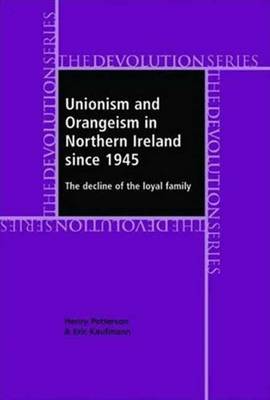Devolution
1 total work
Unionism and Orangeism in Northern Ireland Since 1945
by Henry Patterson and Eric P. Kaufmann
Published 30 April 2007
The Ulster Unionist Party and the Orange Order dominated the political landscape of the Protestant community in Northern Ireland for most of the twentieth century, but up until now scholars of Irish history and politics have lacked access to the internal documents of both organizations. This is the first book which is based on unprecedented access to the archives of both the Party and the Order. The history depicted in this book is of two organisations which even at the apogee of their powers in the 1950s were riven with major stresses and conflicts. It shows just how precarious the position of the Unionist and Orange elites was as they struggled to deal with conflicting demands: of working class Protestants for British standards of welfare and wages, of industrialists who opposed the 'socialistic' government at Stormont, of rank and file Orangemen who denounced the Government for restrictions on their right to march and of Border Unionists who opposed new factories that might employ 'disloyalists' i.e. Catholics. From the mid-1960s, the Unionist government faced unprecedented pressure for reform from the civil rights movement and the successive British governments.
The book provides for the first time a comprehensive analysis of how the Unionist Party's grassroots mobilized against the reforms and for tough action against the developing IRA campaign. It reveals the complex role played by the leadership of the Orange Order in both opposing change and at the same time stemming the rise of Paisleyism and Protestant paramilitarism. It reveals the key role played by the UUP leader James Molyneaux and his Orange allies in stabilizing the party's position and the subsequent dissolution of the alliance under David Trimble's leadership with his support for the Belfast Agreement.
The book provides for the first time a comprehensive analysis of how the Unionist Party's grassroots mobilized against the reforms and for tough action against the developing IRA campaign. It reveals the complex role played by the leadership of the Orange Order in both opposing change and at the same time stemming the rise of Paisleyism and Protestant paramilitarism. It reveals the key role played by the UUP leader James Molyneaux and his Orange allies in stabilizing the party's position and the subsequent dissolution of the alliance under David Trimble's leadership with his support for the Belfast Agreement.
